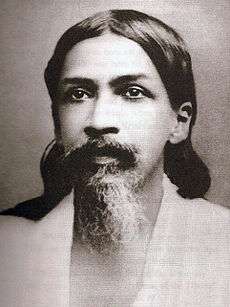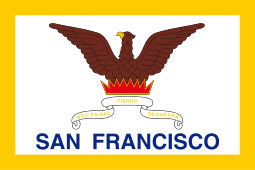California Institute of Integral Studies
Former names | American Academy of Asian Studies, California Institute of Asian Studies |
|---|---|
| Type | Private, nonprofit |
| Established | 1968 |
Academic affiliation | Accredited by WASC |
| President | Joseph L. Subbiondo |
Academic staff | 80 core faculty |
| Students | 1,510 |
| Location | San Francisco, California |
| Campus | Urban |
| Newsletter | CIIS Today |
| Website | ciis.edu |
| Sri Aurobindo |
|---|
 |
|
Family
|
|
Speeches and books |
|
Teachings |
|
Places |
|
Communities |
|
Disciples
|
|
Journals and Forums |
California Institute of Integral Studies (CIIS) is a private, non-profit university founded in 1968 and based in San Francisco, California.[1] It currently operates in two locations; the main campus near the confluence of the Civic Center, SoMa, and Mission districts,[2] and another campus for the American College of Traditional Medicine in Potrero Hill neighborhood.[3] CIIS has a total of 1,510 students and 80 core faculty members.[4]
CIIS consists of four schools: the School of Professional Psychology & Health, the School of Consciousness and Transformation (mainly humanities subjects), the School of Undergraduate Studies, and the American College of Traditional Chinese Medicine (ACTCM). ACTCM became the fourth school after merging with CIIS on July 1st, 2015.[5]
Many courses combine mainstream academic curriculum with a spiritual orientation, including influences from a broad spectrum of mystical or esoteric traditions. Although the Institute has no official spiritual path, some of its historical roots lie among followers of the Bengali sage Sri Aurobindo.[6]
History, character & influence
The California Institute of Integral Studies (CIIS) was founded in 1968 in San Francisco, California.[1]
CIIS was characterized as a major center of the Human Potential movement. According to Gleig and Floress (2013), "one can trace a direct line from Integral Yoga through [the Cultural Integration Fellowship] to two of the major centers of the Human Potential movement and the transpersonal psychology field it birthed: Esalen and the California Institute of Integral Studies (CIIS)." [7]
Gleig and Flores further explain that:
CIIS's distinctive signature is the development of an integral education that combines academic scholarship with spiritual transformation and through its student body, faculty publications, and popular public program it has significantly shaped contemporary East-West spiritualities. As with the other main creative lineage centers - Esalen and CIF - CIIS is committed to a pluralistic spiritual vision and its Aurobindo roots are somewhat hidden. [7]
According to Jim Ryan, CIIS, as developed by the founder (Chaudhuri), "had a very wide academic reach, far beyond its basic East-West philosophy concentration. Theses and dissertations were done over many years on the politics, economics, anthropology, sociology, and area studies of many nations of the world."[8]:52
Accreditation
CIIS is an accredited member of the Western Association of Schools and Colleges (WASC).[9] In addition, degrees offered through ACTCM are accredited by the Accreditation Commission for Acupuncture and Oriental Medicine (ACAOM).[10]
APA accreditation Status
In 2003, the Doctor of Psychology (PsyD) program in Clinical Psychology received accreditation from the American Psychological Association (APA). This accreditation was revoked in 2011. CIIS's appeal of the decision was denied in 2012.[11][12][13] CIIS applied for APA accreditation in June 2016 and is currently awaiting a final decision.[14]
Notable people
- Dave Carter
- Nadinne I. Cruz
- Stanislav Grof
- Will Hall
- Joanna Macy
- Robert A. McDermott
- Starhawk
- Brian Swimme
- Richard Tarnas
- Judith Tyberg
- Alan Watts
- Haridas Chaudhuri
- Noah Levine
References
- 1 2 Taylor, Bron R. (2005). The encyclopedia of religion and nature (1 ed.). London [u.a.]: Thoemmes Continuum. p. 251. ISBN 9781843711384. OCLC 315210594.
- ↑ "Map/Directions". Retrieved 2016-12-01.
- ↑ "Main Campus - American College of Traditional Chinese Medicine". www.actcm.edu. Retrieved 2016-12-01.
- ↑ http://www.ciis.edu/about-ciis/ciis-at-a-glance
- ↑ "ACTCM at CIIS - American College of Traditional Chinese Medicine". www.actcm.edu. Retrieved 2016-12-01.
- ↑ "From the American Academy of Asian Studies to the California Institute of Integral Studies"
- 1 2 Ann Gleig and Charles I. Flores (2013), "Remembering Sri Aurobindo and the Mother: The Forgotten Lineage of Integral Yoga" (chapter 2) In: Singleton, Mark; Goldberg, Ellen (2013). Gurus of Modern Yoga. Oxford University Press. ISBN 9780199938704. OCLC 861692270.
- ↑ Jim Ryan, "The Complete Yoga: The Lineage of Integral Education" in: Gunnlaugson, Sean Esbjörn-Hargens, Jonathan Reams, Olen (2010). Integral education new directions for higher learning. Albany: State University of New York Press. pp. 47–54. ISBN 9781438433509. OCLC 658060931.
- ↑ "WASC: Statement of Accreditation Status, California Institute of Integral Studies". Directory.wascsenior.org. 2013-11-14. Retrieved 2013-12-03.
- ↑ "Accreditation & Approval".
- ↑ Accredited Programs in Clinical Psychology , American Psychological Association. Accessed online January 25, 2013.
- ↑ CoA Statement and CIIS Response to Revocation of Accreditation "Archived copy". Archived from the original on 2013-08-08. Retrieved 2013-08-08. , American Psychological Association. Accessed online January 25, 2013. Archived September 15, 2013, at the Wayback Machine.
- ↑ "All Approved Doctoral Programs Listed by Jurisdiction". National Register of Health Service Providers in Psychology. Retrieved 8 September 2014.
This program’s accreditation has been revoked. (Under Appeal)
- ↑ "Programs Applying for Initial Accreditation". http://www.apa.org. Retrieved 2016-11-30. External link in
|website=(help)
